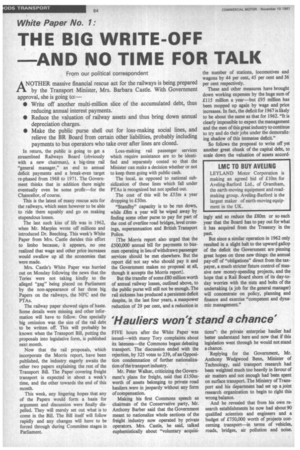THE BIG WRITE-OFF AND NO TIME FOR TALK
Page 86

If you've noticed an error in this article please click here to report it so we can fix it.
From our political correspondent ANOTHER massive financial rescue act for the railways is being prepared by the Transport Minister, Mrs. Barbara Castle. With Government approval, she is going to:—
• Write off another multi-million slice of the accumulated debt, thus reducing annual interest payments.
• Reduce the valuation of railway assets and thus bring down annual depreciation charges.
• Make the public purse shell out for loss-making social lines, and relieve the BR Board from certain other liabilities, probably including payments to bus operators who take over after lines are closed.
In return, the public is going to get a streamlined Railways Board (obviously with a new chairman), a big-time rail "general manager," an end to annual deficit payments and a break-even target re-phased from 1968 to 1971. The Government thinks that in addition there might eventually even be some profit—for the Chancellor, of course.
This is the latest of many rescue acts for the railways, which seem however to be able to ride them equably and go on making stupendous losses.
The last such kiss of life was in 1962, when Mr. Marples wrote off millions and introduced Dr. Beeching. This week's White Paper from Mrs. Castle derides this effort to limbo because, it appears, no one realized that wage and other price increases would swallow up all the economies that were made.
Mrs. Castle's White Paper was hurried out on Monday following the news that the Tories were not taking kindly to the alleged "gag" being placed on Parliament by the non-appearance of her three big Papers on the railways, the NFC and the PTAs.
The railway paper showed signs of haste. Some details were missing and other information will have to follow. One specially big omission was the size of the rail debt to be written off. This will probably be known when the Transport Bill, putting the proposals into legislative form, is published next month.
Now that the rail proposals, which incorporate the Morris report, have been published, the industry eagerly awaits the other two papers explaining the rest of the Transport Bill. The Paper covering freight transport is expected in about a week's time, and the other towards the end of this month.
This week, any lingering hopes that any of the Papers would form a basis for argument and discussion were finally dispelled. They will merely set out what is to come in the Bill. The Bill itself will follow rapidly and any changes will have to be forced through during Committee stages in Parliament. Loss-making rail passenger services which require assistance are to be identified and separately costed so that the Minister can make a decision whether or not to keep them going with public cash.
The local, as opposed to national subsidization of these lines which fall under PTAs is recognized but not spelled out.
The cost of this will be £55m a year dropping to £50m.
"Standby" capacity is to be run down, while £8m a year will be wiped away by finding some other purse to pay for part of the cost of overline road bridges, level crossings, superannuation and British Transport Police.
[The Morris report also urged that the £500,000 annual bill for payments to busmen operating in lieu of withdrawn passenger services should be met elsewhere. But the report did not say who should pay it and the Government makes no proposal at all, though it accepts the Morris report].
But the transfer of some £80 million worth of annual railway losses, outlined above, to the public purse will still not be enough. The rail sickness has produced a persistent deficit despite, in the last four years, a manpower reduction of 29 per cent, and a reduction in the number of stations, locomotives and wagons by 44 per cent, 45 per cent and 36 per cent respectively.
These and other measures have brought down working expenses by the huge sum of £.115 million a year—but £95 million has been mopped up again by wage and price increases. In fact, the deficit for 1967 is likely to be about the same as that for 1962. "It is clearly impossible to expect the management and the men of this great industry to continue to try and do their jobs under the demoralizing shadow of this immense deficit."
So follows the proposal to write off yet another great chunk of the capital debt, to scale down the valuation of assets accord
LMC TO BUY AVELINO
LEYLAND Motor Corporation is making an agreed bid of £10m for Aveling-Barford Ltd., of Grantham, the earth-moving equipment and roadmaking group. Aveling-Barford is the largest maker of earth-moving equipment in the UK.
ingly and so reduce the £80m or so each year that the Board has to pay out for what it has acquired from the Treasury in the past.
But since a similar operation in 1962 only resulted in a slight halt to the upward gallop of the deficit the Government are pinning great hopes on three new things: the annual pay-off of "obligations" direct from the taxpayer, a much stricter future control of massive new money-spending projects, and the hope that a Rail Board shorn of its day-today worries with the nuts and bolts of the undertaking (a job for the general manager) will concentrate on policy, planning and finance and exercise "competent and dynamic management."




































































































































































































































































